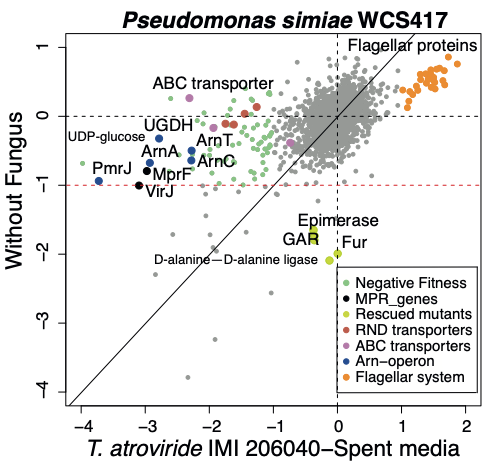The Science
The rhizosphere that surrounds plant roots is a hotspot for bacteria, fungi, and other microorganisms. While how roots interact with bacteria is relatively understood, the dynamics between bacteria and fungi in the rhizosphere are less clear. In this work, m-CAFEs researchers at UC Berkeley focused on Trichoderma atroviride, a fungus in the root zone that produces complex substances influencing plant-microbe interactions. Observing lab-altered bacteria revealed that exposure to Trichoderma substances weakened certain bacterial mutants (those with lesions that alter antibiotic resistance and iron transport) but strengthened others (those with lesions that affect purine biosynthesis). This study underscores how Trichoderma substances shape microbial communities and illustrates that interactions between bacteria and fungi in the rhizosphere can be either helpful or harmful, with different bacteria showing unique responses.

The Impact
These discoveries regarding interactions between bacteria and Trichoderma atroviride in the rhizosphere could benefit sustainable agriculture by enhancing the management of microorganisms in the crop rhizosphere, influencing the development of more effective biopesticides and disease-resistant crops. Moreover, these findings enrich a basic understanding of microbial ecology in plant growth environments, providing key insights for more efficient and environmentally-friendly strategies for food production and soil management.
Summary
Clarifying the interactions between bacteria and Trichoderma atroviride in the rhizosphere builds understanding of plant-associated microbiota dynamics and the delicate balance between beneficial and inhibitory microbial relationships in plant growth environments. Moreover, using bacterial mutant pools as biosensors emerged as a powerful technique, shedding light on the genetic mechanisms governing these complex interactions. This advance not only deepens current knowledge of microbial communication in plant ecosystems, but paves the way for strategic agricultural interventions that improve crop health and environmental sustainability.
Contact
José Manuel Villalobos Escobedo Plant and Microbial Biology Department, The University of California, Berkeley Environmental Genomics and Systems Biology Division, Lawrence Berkeley National Lab jose.villalobos@berkeley.edu

N. Louise Glass
Plant and Microbial Biology Department, The University of California, Berkeley Environmental Genomics and Systems Biology Division, Lawrence Berkeley National Lab lglass@berkeley.edu

Funding
The work conducted in this study was funded by the m-CAFEs Microbial Community Analysis & Functional Evaluation in Soils (mCAFEs@lbl.gov), a Science Focus Area led by Lawrence Berkeley National Laboratory and supported by the U.S. Department of Energy, Office of Science, Office of Biological & Environmental Research under contract number DE-AC02- 05CH11231.
Publications
Villalobos-Escobedo, J. M., Mercado-Esquivias, M. B., Adams, C., Kauffman, W. B., Malmstrom, R. R., Deutschbauer, A. M., & Glass, N. L. (2023). Genome-wide fitness profiling reveals molecular mechanisms that bacteria use to interact with Trichoderma atroviride exometabolites. PLoS Genetics, 19(8), e1010909. DOI: https://doi.org/10.1371/journal.pgen.1010909 OSTI: 2004597
